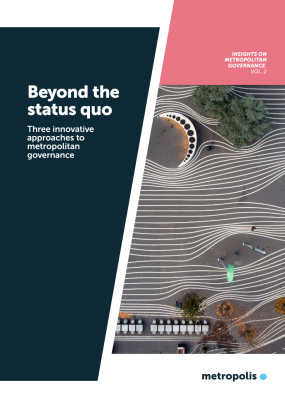Beyond the status quo
Date of publication
Topic
Metropolitan Governance
Type of resources
Report
After outlining different metropolitan governance models in the first volume of this series, this second report focuses on presenting three innovative approaches to metropolitan governance that call to move beyond the status quo of rigid, fragmented administrative models. By integrating these approaches as complementary tools, they can help urban leaders implement transformative policies aimed at improving quality of life.
What’s inside?
An exploration of three innovative approaches to metropolitan governance and how they intersect. These approaches are:
- Mission-oriented governance: A transformative approach for metropolises
- Adaptive governance: Navigating metropolitan challenges in real time
- Distributed governance: Collaboration for inclusive solutions
Key conclusions
- Mission-oriented governance is a call for mayors to articulate a clear vision for their city. The strength of this approach lies in its ability to turn ambitions into action plans. The realization of a truly metropolitan vision within a given area does not inherently necessitate the creation of entirely new governing bodies or an expansion of bureaucratic layers.
- Adaptive governance provides the tools to respond to shifting conditions by embedding feedback loops, encouraging continuous learning, and refining policies based on outcomes.
- Distributed governance decentralizes decision-making, creating space for local and metropolitan governments, community groups, private enterprises, and residents to co-create solutions. Distributed governance requires robust coordination mechanisms to ensure alignment and avoid fragmentation.
- These models are not mutually exclusive but complementary. Together, they form a cohesive approach to governance that is dynamic, inclusive, and focused on long-term impact.
- While these governance models hold immense promise, their implementation faces significant barriers. Financing gaps are among the most pressing challenges. Many cities, particularly at the metropolitan level, lack the funds to invest in innovative solutions.
- The path forward demands bold leadership, innovative thinking, and a commitment to collaboration. Enabling legislation that supports multilevel governance is essential to empower mayors and metropolitan managers to act decisively.

Beyond Status Quo 7.pdf1.79 MB

